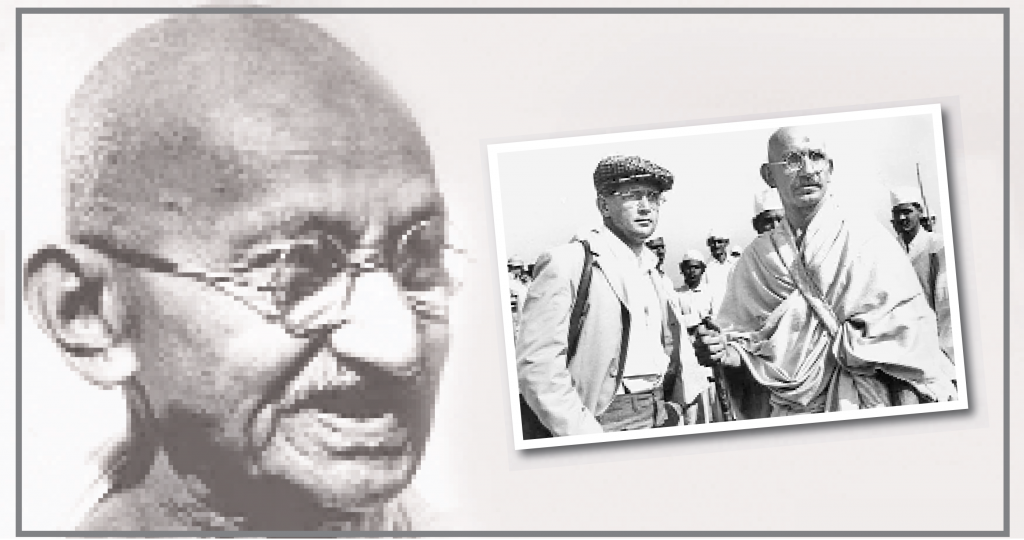Father of the Nation Mahatma Gandhi has inspired many people across the world. His life and vision has been the subject of films, plays and literature. His philosophy of peace and non-violence has been portrayed vividly in several films. The Richard Attenborough film Gandhi was a huge hit worldwide, winning several Oscar awards. More recently, Lage Raho Munna Bhai, a Hindi film based on Gandhi’s philosophy, was a big commercial success. The Odia film Mu Gandhi Nuhen touched the hearts of Odia viewers. Sunday POST looks at Gandhi in popular culture and talks to the cast of the Odia film which focused on Gandhian philosophy.
Gandhi, released in 1982, is still regarded as the most acclaimed tribute to Mahatma Gandhi’s life. The film starring Ben Kingsley as Gandhi received Oscars in eight categories including Best Motion Picture, Best Actor and Best Director. It is said that Kingsley turned in the performance of his life as Gandhi in the film. He became so closely linked with the iconic role that the rest of his career has been an attempt to move away from it.
However, Kingsley is not the only one known for his portrayal of Gandhi on screen. Indian actor Surendra Rajan also earned much acclaim for portraying Gandhi in four films: Rajkumar Santoshi’s The Legend of Bhagat Singh (2002), Shyam Benegal’s Bose: The Forgotten Hero (2005), Carl Hindmarch’s TV film The Last Days of the Raj (2007) and the short film Gandhi: The Silent Gun (2012).
Another film that dwelt upon Gandhian thought is the Rajkumar Hirani directed 2006 film Lage Raho Munna Bhai starring Sanjay Dutt. The film brought forth the relevance of Gandhi’s ideology of non-violence in contemporary times. It introduced a new epithet ‘Gandhigiri’ to bring home the relevance of Gandhi’s tenets in today’s world. It was interesting to watch Munnabhai, played by Sanjay Dutt in the movie, solving problems after getting tips from Bapu, played by Dilip Prabhavalkar. Of course, Mahatma’s character in the film is visible only to the protagonist as he is the only one who wants to walk on the Gandhian path.
Two other remarkable films which espoused Gandhi’s teachings were Ketan Mehta’s Sardar (1993) and Kamal Haasan’s Hey Ram (2000). In both these movies, the protagonists convert to the non-violent ideology after a meeting with the Mahatma. In Hey Ram, Naseeruddin Shah delivers a gripping performance as a frail Gandhi in his older years.
Odia film Mu Gandhi Nuhen narrates the pros and cons of Gandhian ideology in modern times. Of course, the film dwells not only upon Gandhi’s non-violence but also showcases Subhas Bose’s militant policy.
Karan Singh Ray, protagonist of the film, told Sunday POST, “The movie’s theme revolves around a teacher with two sons who strongly believes in the Gandhian principle of non-violence. He is the head of a happy family with traditional values. The elder son, portrayed by me, becomes a police official. As per his Gandhian father’s wish, initially he adopts the principle of non-violence and performs his duty accordingly. When the family faces harassment, he tries to take care of all issues without using violence. But a time comes when his father himself realises that it is not easy to follow non-violence in today’s world. He says, ‘Tu Gandhi Nuhen’ (You are not Gandhi) and advises his son to follow Subhas Bose’s way instead of Gandhian non-violence. The police inspector then goes on to punish all the wrongdoers in the climax.”
Mu Gandhi Nuhen earned big applause for its content and the performances by all the actors. The song Tu Sata Pathare Chalibu shows a few visuals from the freedom movement. Suraj Mishra, the director said, “The story dwells upon the conflict of the protagonist on whether to adopt the militant policy of Bose or non-violence propounded by Gandhi.”
Gandhi and his ideology have been portrayed not only in movies, but also on stage. The play Mahatma vs. Gandhi directed by Feroz Khan had Naseeruddin Shah playing the Mahatma. The play explored the complex father-son relationship between Mahatma Gandhi and his eldest son, Harilal Gandhi. Another popular play Me Nathuram Godse Boltoy, directed by Pradeep Dalvi, depicts the life of the Mahatma’s assassin, Nathuram Godse. The play generated much controversy for the supposedly unbiased portrayal of the circumstances in which Gandhi’s murder was plotted and carried out by Godse.
Himanshu Guru, OP

